For a day recently, the small West African country of Guinea-Bissau had two presidents and two prime ministers, until one of the presidents stepped down citing death threats.
The country has been gripped by political turmoil for so many years that analysts do not agree on exactly how many coups it has had in its 46 years of independence. Some say nine, others count 10. An election held last year was another attempt to carve a new peaceful path but it has sparked yet more chaos, as journalist Ricci Shryock reports.
Amidst the political chaos, daily life appears to be carrying on as normal in the capital, Bissau, but underneath the veneer, residents say they are deeply frustrated with the political chaos and confused about what will happen next and whom to believe.
While the Portuguese word “saudades” expresses a longing for the past, the feeling in Bissau is more akin to a longing for a more prosperous future they know is possible, but each time Bissau-Guineans’ raise their hopes, they are dashed by political manoeuvring – often backed by guns.
Along the streets, women are selling the country’s number-one cash crop – freshly harvested cashews.
But the presence of armed soldiers is a reminder that things are not normal.
The absence of trusted sources of news has provided good fodder for rumours and innuendo, with people constantly trying to parse what is true and what is not.
Contradictory official communiqués and letters from various sides, about who is the rightful president, are being shared on WhatsApp and Facebook in the country of 1.8 million people.
- Population:1.6 million
- Major languages:Portuguese and Crioulo
- Cocaine:Major trafficking hub from Latin America to Europe
- Cashew nuts:Fourth largest exporter
- Poverty:Nearly 70% of the population live on less than $1.90 per day
Source: UN, World Bank, WHO

“We don’t know what’s going on,” said a hotel manager, Aboubacar, as he scrolled through his Facebook feed. He furrowed his brow and frowned as he tried to decide which local blogs to read.
One restaurant owner, who said the chaos was hurting her business, added: “For such a tiny country, it’s amazing how much fake news we can produce.”
Umaro Cissoko Embaló was announced as the winner of December’s election.
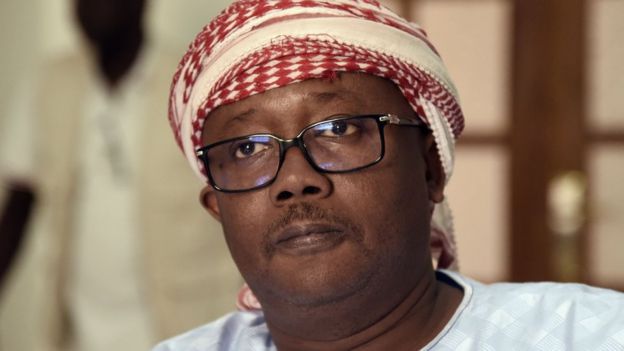
The long-time ruling party PAIGC however alleged it was cheated out of victory and insists that Mr Embaló waits for the Supreme Court to rule on its third request to annul the elections. But he refused and has taken the oath of office.
And in the meantime, PAIGC lawmakers, who say that an alliance with smaller parties means they still have a majority in parliament, swore in one of its members as president and insisted their current prime minister stay in office.
However, shortly afterwards PAIGC Cipriano Cassamá stood down, citing fears for his safety.
Fake news fills the vacuum
“The problems in Bissau are structural problems, and the country has never really stabilised politically,” said Gilles Yabi, founder of West African think-tank, Wathi.
“The country has the history of war, fighting for independence from Portugal, so the presence of the military is directly linked to this history, and the role the military played to get independence.”
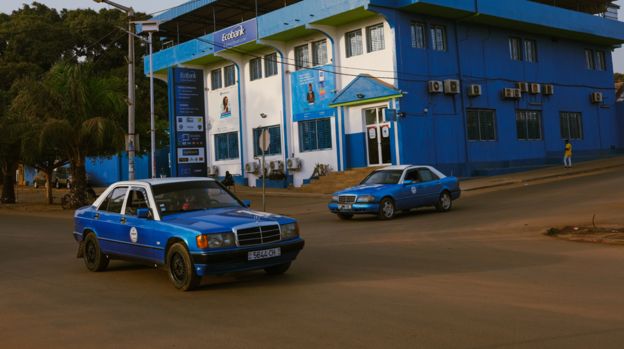
He added there were other factors at play in the current crisis.
“The main problem is the political class of the country, and the fact that they have been fighting for power for a long time. The current situation is very polarised. Depending on whom you talk to, they will have quite a different version of things.”
There are two competing versions at the moment: While the PAIGC says the elections was rigged, the opposing side, MADEM-G15, says its candidate Mr Embaló won December’s polls and is now rightfully installed at the presidency.
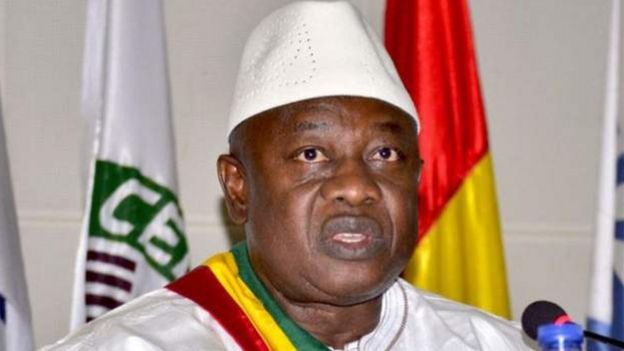
The National Election Commission has repeatedly confirmed that Mr Embaló won the polls with 54% of the vote, and at least one minister in his government has publicly accused their opponents of bribing a Supreme Court judge to rule in PAIGC’s favour and stall the confirmation of Mr Embaló’s win.
Both sides say they have proof, but in the vacuum of that proof, residents’ social media feeds are flooded with false news reports of weapons seizures at a political party’s headquarters and politicians hiding out at foreign embassies – events that never happened.
Bissau and the cocaine trade
To add to the confusion, Guinea-Bissau has for many years been used as a staging post in the trafficking of cocaine from Latin America to Europe.
The PAIGC’s Aristides Gomes, who still says he is the rightful prime minister, has claimed that narco-trafficking is the main factor behind the current political instability.

A brief history of Guinea-Bissau:

1446-47: First Portuguese arrive; subsequently administered as part of the Portuguese Cape Verde Islands, the Guinea area becomes important in the slave-trade. Guinea-Bissau becomes a separate colony in the Portuguese Empire in 1879.
1974: Independence following a guerrilla war.
1980: Country’s first president, Luís Cabral, is ousted in military coup led by João Bernardo Vieira; plans for unification with Cape Verde dropped. The overthrow is the first of many political coups that undermine the country’s stability over the next four decades.
2010: US names two top military officials as international drugs traffickers and freezes their US assets. EU announces it is ending mission to reform Guinea-Bissau’s security forces, saying lack of respect for rule of law is making this an impossible task.
2011: EU suspends part of its aid to Guinea-Bissau because of concerns over governance and the rule of law. Several months later, thousands take to the streets to demand the resignation of Prime Minister Carlos Gomes Júnior for his failure to curb rising food prices.
2012: The UN Security Council expresses concern that drug trafficking has increased, and demands a return to constitutional rule.
2020: Umaro Cissoko Embaló takes office

Experts say drug traffickers can profit from the current political chaos, and there were already reports that one notorious trafficker who had previously fled the country was spotted back in Bissau at a downtown hotel last week.
This report was denied by Ibrahima Jalo, an ally of Mr Embaló, who heads the association of 18 political parties which is not represented in the assembly.
“No, no, no… Drug trafficking? In this country? No. Please. The drug trafficking here in Guinea-Bissau was maybe happening before, but it will never happen again.”
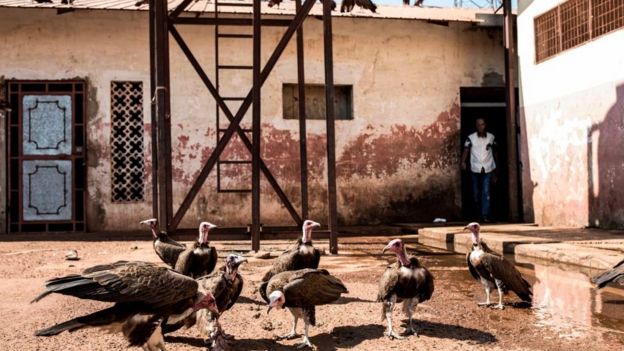
In the past, the military and navy have been heavily linked to the country’s drug trade.
In 2013, US Drug Enforcement Administration arrested the former head of the navy as he was attempting to close a million-dollar cocaine deal going through Guinea-Bissau.
Trafficking reportedly dropped off in Guinea-Bissau after that, but some experts say the recent few years of political crisis have reopened the corridor.
Amidst the chaos, nearly 1,000 hooded vultures were killed in a mass poisoning in the east of the country. Some said it was a bad omen for the country.
Fighting in the courts, not with guns
Vincent Foucher, a researcher for the French National Centre for Scientific Research, stresses that the latest iteration of the crisis appears at least for now to be more peaceful than some in the past.
“I think it’s quite important to note that the elites have realised that now the competition is fought with and around legal norms. It’s not about killing people – well for now – or coups. Let’s hope it stays that way,” he said.
However, all parties insist the law is on their side.
“It’s always this thing that in Bissau people bend the law in one sense or another as suits their interests in the position of the moment. The law is bendable and it’s not strong enough, not written clearly enough to an extent, and that’s part of the problem even though it’s not the cause of the problem,” Mr Foucher added.
Foreign involvement is also complicating the situation.
Senegalese President Macky Sall has been outspoken in his support of Mr Embaló’s presidency and his Prime Minister Nuno Gomes Nabiam.
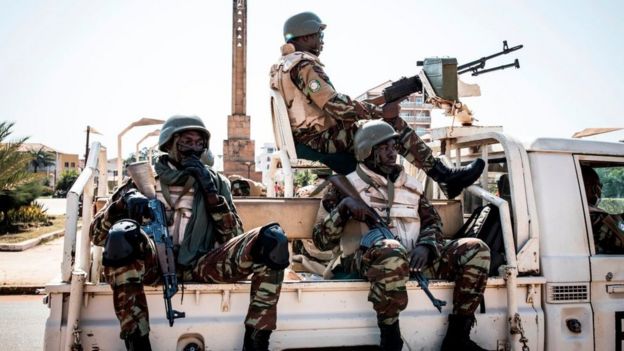
The PAIGC has, however, denounced Senegal for what it says is interference in Guinea-Bissau’s internal politics and that it wants to control the country’s development – or lack thereof – especially when it comes to contentious maritime rights along their shared border.
Regional body Economic Community of West African States (Ecowas) has said Mr Embaló’s inauguration was outside the legal framework. A claim Mr Embaló’s supporters rejected.
Still dreaming of a better future
Meanwhile, young people in the country lament that the political crisis in the country has lasted their entire lives.
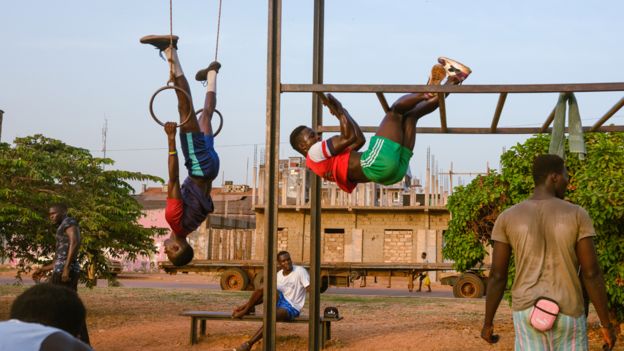
Teachers and healthcare workers have been on strike since late last year, and many in the capital express a desire for the international community to intervene.
Ecowas was scheduled to send a team of experts to mediate this week, but they cancelled their mission under pressure from Mr Embaló ‘s government at the last minute.
The UN Security Council also late last week urged security and defence forces not to interfere with the post-electoral political crisis.
Amid the chaos, at a café across the street from both the presidential palace and the PAIGC headquarters, one man shrugged his shoulders in frustration over the crisis. “As long as we are alive, we will dream,” he said as he smiled nervously.
Credit: Source link